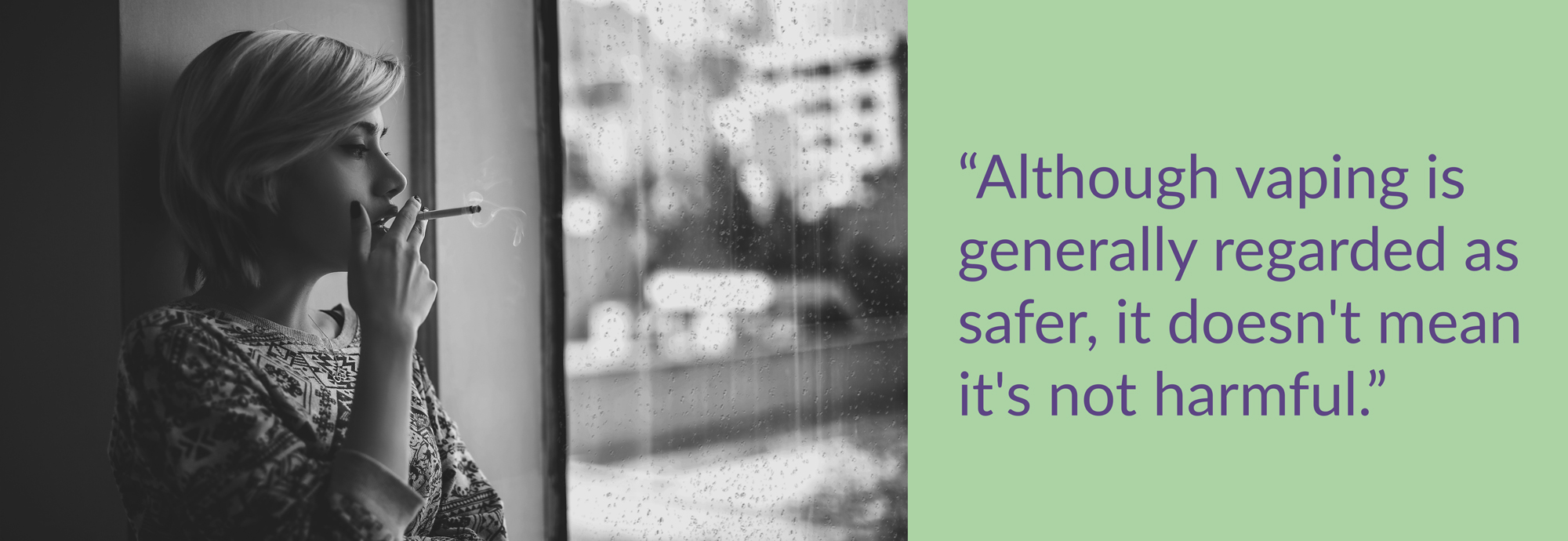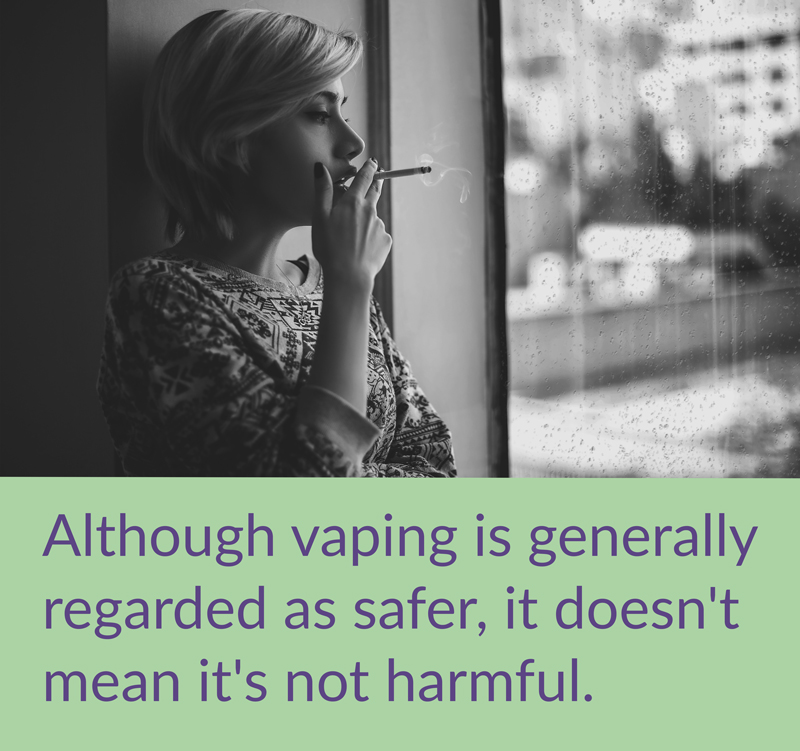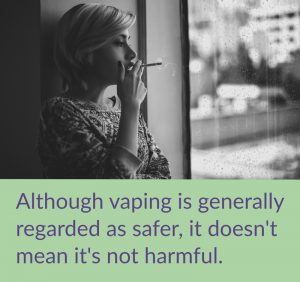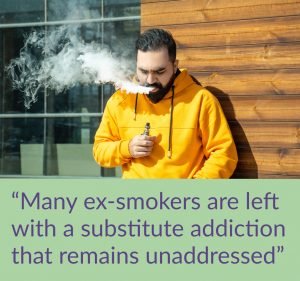

Is vaping whilst pregnant bad for you? We hope that with our experience in smoking cessation, we can help you to make up your own mind by providing the answers you need in a balanced and non-biased way.
Vaping while pregnant - is it safe?
The health risks associated with smoking cigarettes are well known, so when women are planning a pregnancy or find out that they are pregnant, more often than not they are advised to try and quit the habit by their GP or healthcare professionals.
Giving up completely is of course the best course of action to ensure the health and safety of both mother and child, but quitting smoking isn’t easy, so some pregnant women opt to look at vaping as a less harmful alternative or way to dramatically cut down on the number of cigarettes that they are smoking.
This has become more common recently, especially since the government’s health body ‘Public Health England’ officially reported that vaping was ‘95% safer than smoking’ and was the most prevalent way for smokers in England to stop. (27.2%).
Should I Vape When I am Pregnant?
The most straightforward answer is no, you shouldn’t vape when you are pregnant.
Whilst vaping is generally understood to be less harmful than smoking cigarettes and is sometimes recommended to expectant mothers by GPs as a safer alternative, nicotine can cause permanent damage to a baby’s developing brain and other organs during this critical period of fetal growth, leading to birth defects, so nicotine should be avoided completely in the best case scenario.
Is it safer than smoking?
Tobacco product directive (TPD) compliant e-liquids do not contain any carcinogenic chemicals when used correctly. This is a contrast to the thousands that are found in cigarette smoke. The NHS support vaping as a much safer alternative to smoking cigarettes. So from a cancer causing (carcinogenic) perspective, vaping is safer than smoking, but if you vape e-liquid with nicotine in, the risk of this part causing birth defects is still present.
So if you are going to smoke cigarettes whilst pregnant, vaping is a safer option, but vaping without nicotine or not vaping at all are much safer options.
Looking to quit vaping?
Can I vape just a small amount?
If you can vape without nicotine to replace the physical and psychological habit of smoking, then yes, this will reduce the risk of harm to yourself or your baby.
If you are struggling to quit cigarettes whilst pregnant and by vaping with nicotine, you are able to reduce your overall nicotine consumption, this is a positive step, but we would always recommend speaking to your GP as they will be able to give you advice specific to your own set of health circumstances and they will be able to recommend the best course of action.
But quitting completely is always the best solution for expectant mothers.
Can I vape without nicotine?
Vaping without nicotine poses little health risk to either a mother or unborn child and is recommended by health professionals as an excellent way to replace the physical action and social habit of smoking without consuming the carcinogenic chemicals in cigarettes or ingesting nicotine, a chemical known to cause birth defects.
Is passive vaping harmful?
Based on the research to date, it is unlikely that passive vaping poses a risk, but longer term research still does not exist, so it’s best to exercise caution if you are pregnant. If you want to be as safe as possible, it’s best to avoid direct contact with people who are vaping and definitely people who are smoking cigarettes.
Find out how to quit vaping today
Does vaping cause cancer?
Again, there is no scientific link between vaping TPD compliant e-liquids and cancer. Long term research does not yet exist as the phenomenon is relatively young, but it is very unlikely to be the case. If you are concerned, don’t take any risks with your unborn child.
What are the Repercussions of vaping whilst pregnant?
According to NHI (National Health Institute), vaping while pregnant can result in lung damage to unborn babies and increase the risk of sudden infant death syndrome (SIDS) to the same extent as smoking.
Other health risks from vaping for an unborn child include childhood asthma and wheezing. For the mother, vaping can cause sore throat, headaches, and COPD.
What does vaping do to your lungs?
When using vape devices past the point of their intended use i.e. burning the heating element out and not replacing it, they can emit multiple hazardous substances, such as formaldehyde, acetaldehyde, and acrolein. Not only can these aldehydes cause lung diseases, but they can also cause cardiovascular diseases (aka heart diseases). The effects of this are serious but ensuring you use TPD compliant/tested products and following the guidance provided by a reputable retailer, you shouldn’t be exposing yourself to these risks.
The bottom line
Whilst vaping is generally regarded as a safer alternative to smoking, it doesn’t mean it’s not harmful. Vaping with nicotine may damage the developing fetus. Vaping can even cause SIDS and premature birth.
If you are pregnant and wish to quit smoking, seeking advice from your doctor would be a wise course of action. A doctor can suggest a plan that can help you kick the habit.
Other articles you may be interested in...

Vaping while pregnant – is it safe?
Whilst vaping is understood to be a less harmful alternative to smoking and is sometimes recommended to expectant mothers, nicotine can cause permanent damage to a baby’s developing organs during this critical period of growth.

Is nicotine bad for you?
If you have concerns about whether nicotine is bad for you, we hope that with our many years of experience in the smoking cessation industry, we can help you to make up your own mind on the subject by providing the answers you need in a balanced and non-biased way.

How to Quit Vaping
A large percentage of smokers in the UK have managed to successfully make the switch to vaping as an alternative that is recommended by the NHS as being ‘95% safer than smoking’, but these ex-smokers are now left still feeding a substitute nicotine addiction that remains unaddressed.

